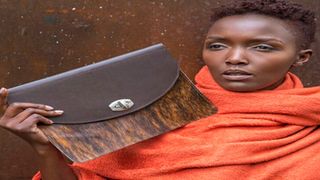
Chebet Mutai, CEO and Founder of WazaWazi Fashion House, displays one of her creations.
| PoolEnterprise
Premium
Economist took a gamble, left employment to establish luxury leather brand
What you need to know:
- The business, founded eight years ago, employs 10 full-time workers who curate footwear, a variety of bags, accessories, as well as products for the home.
- The items, all made from locally sourced materials, cost from as little as Sh300 to as much as Sh30,000.
When Chebet Mutai quit her job at the World Bank, she was certain that entrepreneurship was her calling, despite being aware of the challenges that come with it.
An economist by training, she had researched on Kenya’s leather sector and was convinced of the immense potential that lay in the sector.
She also believed that Africa needed more entrepreneurs focused on manufacturing, because this was what would solve some of the continent’s major problems, such as unemployment among the youth.
Ms Chebet, 37, is the Founder of WazaWazi Fashion House, an afrocentric luxury leather brand which employs 10 full-time workers. She founded the company eight years ago as an online shop before opening a store at Valley Arcade Shopping Mall in Lavington, Nairobi.
At first, she would make her leather products from her house but later outsourced the production to individual bag makers along Nairobi’s Ngong Road.

Chebet Mutai, CEO and Founder of WazaWazi Fashion House, displays one of her creations.
“At some point I operated in a friend’s servant quarters since I could not afford to rent a bigger space, we were later incubated by the National Industrial Training Authority who recognised my potential,” she says.
Gradually, as interest in, and demand for her designs picked up, she realised that she needed a bigger place.
Today, her workshop is located at the ASK Jamhuri Showground, where a number of other SMEs are located.
She curates footwear, a variety of bags, accesories as well as products for the home, all made from locally sourced materials.
“With Covid-19, diversification became critical for survival, we therefore expanded and begun to make products such as woven baskets for export to the US market,” she says, adding that today’s customer is more discerning, and as a producer and service provider, she had to reorganise how the company packaged value for her customers.

Chebet Mutai, CEO and Founder of WazaWazi Fashion House, displays one of her creations.
“Our brand is designed for the local market with a deliberate push for international audiences. It will be interesting to see how the world responds to an even stronger message of what it means to be an African,” she says.
WazaWazi currently ships globally direct to consumers through DHL services, which has an e-commerce package for ‘Made in Kenya to the world’.
“We work with local tanneries to get good quality leather at affordable rates. I physically visit the tanneries to select the leather that would best work with the designs we want to create - we look at various qualities, such as colours and textures. We are focused on customised designs which allow the customer to personalise their orders in terms of colours, hardware and textiles. It is all about what the customer wants, “she says.
WazaWazi is 99 percent an e-commerce business as that gives it access to the global market. Their shop gives walk-in customers a chance to look, touch and appreciate the workmanship of their creations.
Chebet names her creations after people who have had a special impact or influence on WazaWazi.
‘Kittony’, the first bag that she made, was named after her friend, Caroline Kittony, who bought the bag even though it was not perfect.

Handbag from WazaWazi Fashion House, an Afrocentric luxury leather brand.
There is one called ‘Amina’, named after Amina Mohamed, the Cabinet Secretary for Sports. Others include ‘Ciiru’, ‘Inga’ ‘Luoch’, ‘Wangari, ‘Awino’ and ‘Wafula’.
Her products retail from as low as Sh300 while there are those that cost more than Sh30,000. She produces leather backpacks, clutch bags, change purses and laptop or tablet leather cases as well as travel bags and key rings.
“Our customers are lovers of design, quality, cultural diversity and social inclusion through a design-driven product capturing the best of modern day Africa. For us, these are not just lifestyle products, they are personal statement pieces that are extensions of our clients,” she explains.
With great skill, care and attention to detail, Chebet has crafted life-lasting pieces. She explains that her journey towards building a world class luxury lifestyle brand is deeply rooted in her brand’s commitment to improving the lives of talented and often vulnerable youth, with a special interest in young women from disadvantaged and marginalised communities.





